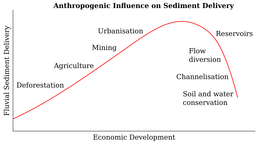Multidecadal Sediment Fluxes to Deltas Under future Environmental Change Scenarios
- Started
- 1st October 2013
- Ended
- 30th September 2017
- Research Team
- Frances Dunn
- Investigators
- Stephen Darby

Anthropogenic influences on fluvial sediment delivery to deltas in relation to economic development, based on work by Syvitski. Continued adequate sediment delivery is vital to maintain deltas above sea level.
Delta environments, on which over half a billion people live worldwide, are sustained by sediment delivery. Factors such as subsidence and sea level rise cause deltas to sink relative to sea level if adequate sediment is not delivered to and retained on their surfaces. Starving a delta of sediment results in flooding, land degradation and loss, which endangers anthropogenic populations and activities. The future of river sediment fluxes, a key mechanism for sediment delivery to deltas, is uncertain due to complex environmental changes which are predicted to occur during the coming decades.
Fluvial sediment fluxes under environmental changes were investigated to assess the global sustainability of 47 deltas under 12 potential future scenarios up to 2100. Climate change, reservoir construction, and population and GDP change datasets were used to drive the catchment numerical model WBMsed, which was used to investigate the effects of these environmental changes on fluvial sediment delivery. The test, sensitivity analysis, and scenario runs of WBMsed were performed on Iridis, with each full run taking 10 days to finish and producing 5TB of data. This was only possible thanks to the Iridis team who enabled me to run the model split over several jobs using checkpointing software and allowed me extra room to store the results. The number of tests and sesnitivity analyses would otherwise have been infeasible.
The results suggest that fluvial sediment delivery to most of the deltas studied in this research will decrease throughout the 21st century, primarily due to human activities. Reservoir construction has the greatest single effect globally, however for some deltas other activities such as land use change were more influential. The deltas for which sediment delivery is negatively influenced by human activities will likely become unsustainable environments, if they are not already, unless catchment management plans are drastically altered.
Categories
Physical Systems and Engineering simulation: Hydrology, Sediment transport
Algorithms and computational methods: Geographic Information Systems
Programming languages and libraries: C++